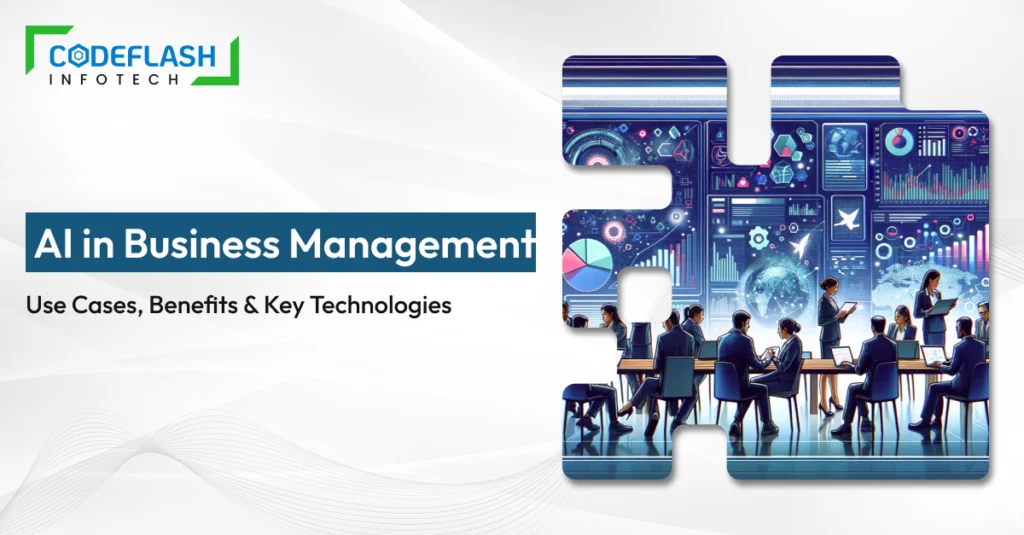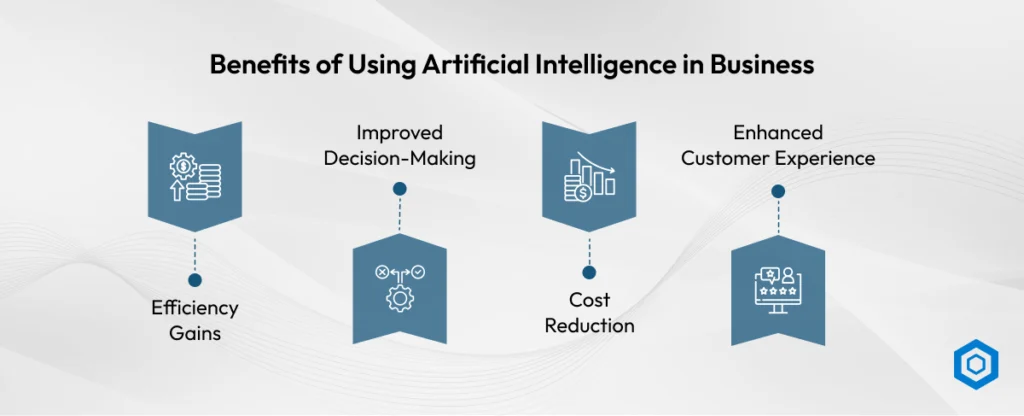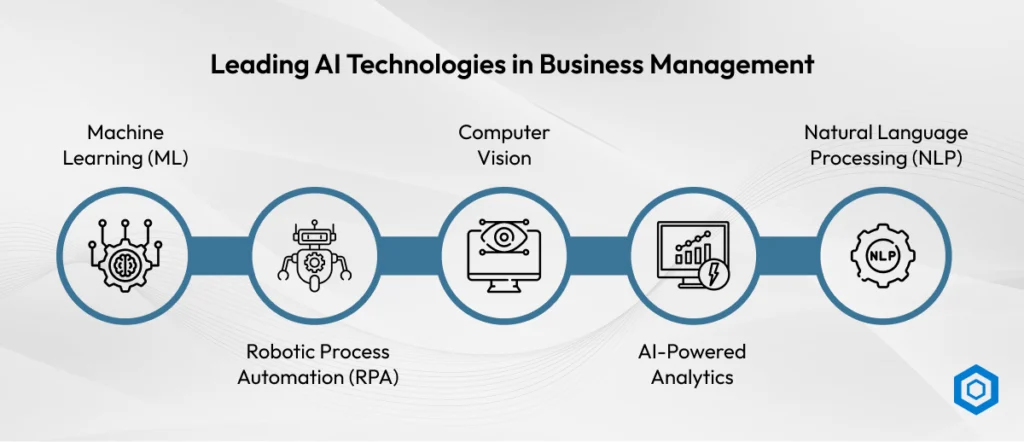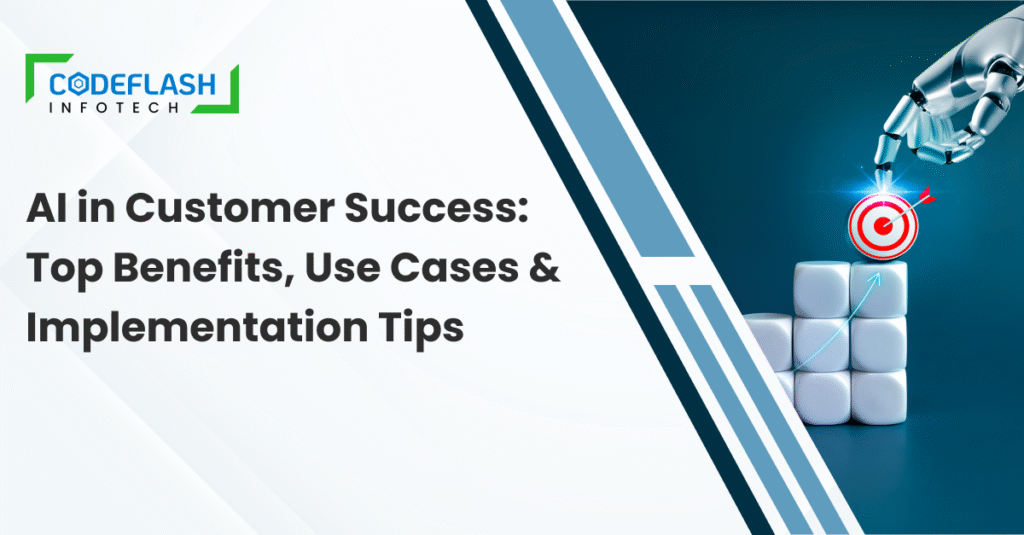
AI in Business Management: Use Cases, Benefits & Key Technologies
25 JULY
Artificial Intelligence (AI) is changing the way companies work, strategize, and develop. Ranging from streamlining the decision-making process to delivering a superior customer experience, the use of artificial intelligence in business operations is no longer a concept of the future, but one that is now used as a strategic imperative. The global artificial intelligence market size is projected to expand at a compound annual growth rate (CAGR) of 37.3% from 2023 to 2030. It is projected to reach $1,811.8 billion by 2030. As the digital revolution unfolds at an increasingly rapid pace across various sectors, AI in business management redefines company workflows, enhances productivity, and yields more brilliant results.
Understanding Artificial Intelligence and Management
The relationship between artificial intelligence and management is evident in the application of AI technologies to address business problems, inform decisions, and enhance human capabilities. Through AI, it is possible to make data-driven judgments that reduce guesswork and waste, and develop personalized experiences with customers. It may be based on chatbots, predictive analytics, or robotic process automation (RPA), but one way or another, AI is deeply rooted in contemporary management approaches.
Ready to leverage AI for your business success? Email us
How Is AI Used in Business Today?
The answer to how AI is used in business lies in its versatility across functions. AI is used by companies across a variety of departments, including marketing, finance, operations, HR, and customer service. Artificial Intelligence-based tools are used to gain insights from large amounts of data, streamline logistics, spot fraud, or forecast customer behavior.
For example, e-commerce utilizes AI to suggest products to customers, and supply chains employ AI to forecast demand and reduce waste. In HR, the use of AI technologies automates the recruiting processes because the systems review resumes and recognise the most suitable applicants in less time than a human workforce.

Key Use Cases of AI in Business Management
The use of AI in business spans several critical areas:
- Predictive Analytics:
AI provides businesses with the analytics of the past to predict trends, demand, and customer preferences. This enables managers to distribute inventory, marketing campaigns, and product development better. - Customer Support Automation:
Customer service has become a standard practice for chatbots and virtual assistants. Such AI tools can respond to inquiries around the clock, have shorter wait times, and pass more complicated questions to human representatives, thus saving their time and improving customer satisfaction rates. - Supply Chain Optimization:
AI has the potential to identify inefficiencies in your logistics and recommend more efficient directions or approaches for inventory management. It assists in disruption management and provides timely deliveries through real-time analytics. - Financial Analysis and Fraud Detection:
In the financial departments, AI technologies are used to track transactions, raise flags on suspicious transactions, and detect fraud. They also help with budgets and forecasting by modelling data properly.
Want to see our proven results in AI-powered business transformation? Explore our portfolio

Benefits of Using Artificial Intelligence in Business
The use of artificial intelligence in business offers several compelling advantages:
- Efficiency Gains:
AI can perform repetitive tasks that would otherwise take time, and these operations are completed much faster and more precisely by AI. This increases operational efficiency, allowing employees to focus on other activities of higher value. - Improved Decision-Making:
AI makes decisions more accurately as it can analyze extensive data, both structured and unstructured, and provide patterns that human managers might not have observed.. - Cost Reduction:
AI enables businesses to operate with reduced expenses by facilitating automation, thereby optimizing the use of resources.
Enhanced Customer Experience:
Customer loyalty and satisfaction are enhanced through personalized interactions driven by AI, whether in a retail, banking, or hospitality business.

Leading AI Technologies in Business Management
Various AI technologies fuel this transformation in business management:
- Machine Learning (ML):
ML algorithms are data-driven and enhance their performance with time. ML is utilized by businesses to recommend products, identify fraudulent activities, and segment clients. - Natural Language Processing (NLP):
NLP allows machines to read and communicate through human language. It is what fuels chatbots, virtual assistants, and sentiment analysis products. - Robotic Process Automation (RPA):
RPA is used to eliminate repetitive, rules-based practices (such as data entry or invoice processing) and minimize the chances of human error and work-related expenses. - Computer Vision:
Used in industries such as manufacturing and retail, computer vision aids in quality control, facial recognition, and visual inspection tasks. - AI-Powered Analytics:
An advanced analytics platform offers reports via dashboards and real-time reports, which enable managers to monitor KPIs, track performance, and make sound decisions.
Conclusion
As technology advances, AI in business management will only become more essential. Companies can create content automatically, generate or even test business approaches before implementation with generative AI. Data privacy and ethical concerns will be the most significant challenges, while the innovation potential is immense.
To maximize the potential of AI, leaders must make investments in digital literacy, data infrastructure, and agile workflows. Human and machine-driven intelligence will become the themes of the next generation of business excellence.
Do you have questions about integrating AI into your business model? Contact us now
Frequently Asked Questions
AI can be applied to automate tasks, analyze large amounts of data, forecast trends, and contribute to decision-making when managing a business. It manages customer attendance, HR, finance, and operations with intelligent systems.
The advantages include increased efficiency, lower costs, better decision-making, improved customer experience, and a stronger competitive advantage. The situation is similar with AI, which enables it to respond to market trends and consumer needs more quickly.
Yes, small businesses can also benefit from AI using relatively affordable tools, such as CRM automation, chatbots, and data analytics platforms. Such tools contribute to efficient work and client interest without significant investments.
AI is not replacing jobs, but it is changing them. It replaces repetitive tasks, allowing people to focus on more creative, strategic, and emotionally charged work.
The benefits of AI can be observed in almost all industries. However, the impact of AI is particularly significant in retail, healthcare, finance, logistics, and manufacturing, where data-driven decision-making and automation can help achieve considerable efficiency.





